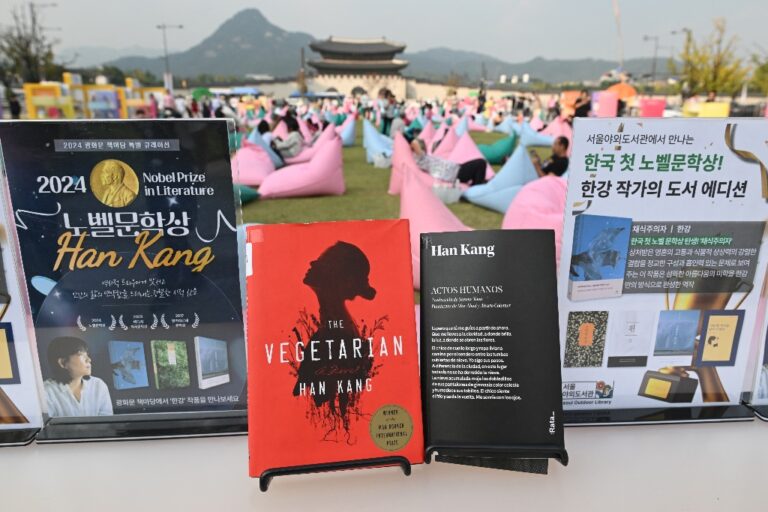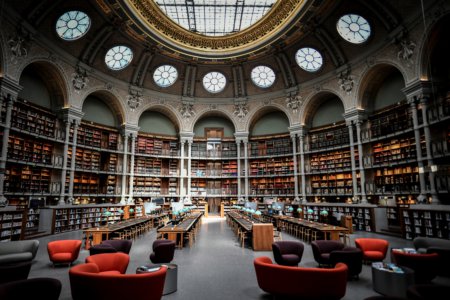
Every year, millions of authors have to compete just to get published on the unstable grounds of the creative industry, let alone recognized for their work.
People online joke about how every book is seemingly a “New York Times Bestseller,” but that’s a story for another day. Today, we’re talking about the much more esteemed Nobel Prize in Literature.
As of 2024, only 121 authors have emerged as Nobel Prize laureates in Literature — an award that recognizes an individual’s lifeline of creative work.
2024’s laurels go to none other than South Korean author, Han Kang, marking her as the country’s first laureate and the first Asian woman to be recognized with the distinguished literary honour.
Awarded “for her intense poetic prose that confronts historical traumas and exposes the fragility of human life,” Han Kang’s work is clear in drawing out the atrocities of human nature through beautiful yet brutal writing.
One example, taken from her book, “The Vegetarian,” is this: “Time was a wave, almost cruel in its relentlessness as it whisked her life downstream, a life she had to constantly strain to keep from breaking apart.”
The story centres on an allegory for patriarchal oppression and female defiance through the narrative of a young woman who stops eating meat.
Artful writing aside, “The Vegetarian” was the first of Han’s books to get an English translation, and it also won her the International Booker Prize in 2016.
Unsurprisingly, beautiful and honest writing is a given when it comes to Nobel laureates, but it does beg the question — in a sea drowned with talented authors, how is the year’s winner of the Nobel Prize for Literature chosen?

Han Kang is the first Asian woman to win the Nobel Prize for Literature, and the 18th woman to win the award. Source: AFP
The process of choosing a Nobel Prize for Literature winner
The year-long process starts and ends in October.
The Nobel Prize for Literature is nominated by the Swedish Academy, which has a working body of elected members behind the Nobel Committee.
On the first Thursday in October — and sometimes the second, or third — while media representatives are fixated on the announcement of that year’s winner by the permanent secretary, qualified sources can send in their nominations for next year’s Nobel Prize for Literature.
Those who are qualified to nominate an author include:
- Members of the Swedish Academy and similar institutions
- Professors of literature and linguistics at universities
- Previous Nobel Prize laureates in Literature
- Presidents of writers’ organisations that represent their country’s literary production
They have to submit their nominations by the end of January the following year.
Through that process, the Literature Administrator compiles a Long List of nominees to be reviewed by the Nobel Committee. The Nobel Committee then goes through the arduous process of sifting through the Long List and narrows it down to 15 to 20 names.
By May, that list shortens down to five nominees for the final award.

The Swedish Academy is in charge of picking the Nobel Prize for Literature winner. Source: AFP
In June, the reading starts.
Members of the Swedish Academy read and review the relevant works of those five authors, submitting individual reports for who they think should be the new Nobel Prize laureate in Literature.
This process ends in September, and by August, the discussions begin for the final winner.
Disagreements may cause a delay in an announcement as with the rest of the Nobel Prizes, but whatever the case is, a winner is chosen when a nominee receives more than half of the votes from academy members.
The winner is finalised by early October. As the permanent secretary goes on to announce who takes centre stage that year, the cycle repeats once again.

Most creative industries do not require formal degrees, but many pursue them anyway. Source: AFP
Do all good writers have a writing degree?
Past Nobel laureates in Literature have one thing in common — they project the voices of those who aren’t heard.
In fiction and non-fiction, their words reflect a semblance of reality.
Ellen Mattson, a writer and member of the Nobel Committee said in an interview that while lifelong writers who’re dedicated to the craft are capable of winning the award, “you also have to have this particular talent and that is something — you can develop it, but you cannot create it within yourself if you’re not born with it, I’m quite certain on this.”
“The winner needs to be someone who writes excellent literature, someone who you feel when you read that there’s some kind of power,” says Mattson. “The romantics would call it a divine spark. For me, it’s a voice that I hear in the writing that I find within this particular writer’s work and nowhere else.”
Han Kang was commended by the Nobel committee for her, “intense poetic prose that confronts historical traumas and exposes the fragility of human life.”
So how do Han and her fellow laureates do it?
The general consensus is that writers don’t need a university degree to be good writers. They just need to write, edit, be edited, and receive feedback. Preferably every day, whether that’s detailing your life in a journal or penning a working novel.
In fact, that’s a popular opinion for the entire creative industry — photographers, designers, and painters. If the talent is already there, would you still need a university degree?
It’s not like nursing, or healthcare, where the requirement to even work is black and white — you do need a degree for those.
If you look at the last 10 years of Nobel laureates in Literature though, would the list confirm or debunk the sentiment?

Anyone can write, but not everyone can write well. Source: AFP
Seven winners of the Nobel Prize for Literature within the last 10 years do, in fact, have college degrees — that’s a majority.
Han Kang graduated from Yonsei University in 1993. She earned a bachelor’s degree, majoring in Korean language and literature. In 1998, she went abroad to the University of Iowa to pursue an International Writing Programme.
It’s clear that her education isn’t far removed from her writing career. She returned to her alma mater to teach “The Writing of Novels” course in 2008 for a period of time.
2023’s winner, Norwegian author and playwright Jon Fosse, went to the University of Bergen to study comparative literature. In 1987, he completed his master’s degree in the same area of study, at the same university.
Fosse won a university writing competition at the age of 20, which he deems to The Guardian to be “the most important prize, except for the Nobel.” In 1983, still a ripe student, he would publish his first book — “Red, Black” — and continue his streak of putting out books throughout his academic pursuit.
French author Annie Ernaux, awarded in 2022, was the first person to go to university among her working-class family. She earned a degree in literature, having studied at the University of Rouen, and then the University of Bordeaux.
She qualified as a teacher and taught at secondary school before going on to pursue writing full-time.

Svetlana Alexievich, the first Belarusian winner, writes her work in the Russian language. Source: AFP
In 2015, Svetlana Alexievich, a pioneer of literary non-fiction, investigative journalism, and oral history, would be the first Belarusian winner of the Nobel Prize for Literature. She captures the world of Soviet Union life in words and uses more of a documentary storytelling style.
She graduated in 1972 from Belarusian State University in Minsk, where she studied to become a journalist.
So, yes, there is a pattern that earning a writing degree could be this unspoken requirement for a Nobel Prize in Literature — though that’s definitely a generous requirement.
It’s also worth noting: that a few of these authors hold more than a bachelor’s.
Abdulrazak Gurnah — a Zanzibar, Tanzania native who fled to the UK — is a novelist and an academic. He taught English and postcolonial literature at the University of Kent, and much of his work centres on colonialism and the life of a refugee. He was the 2021 Nobel Prize for Literature winner.
With such a repertoire, it only makes sense that he’s got a PhD.
Gurnah earned his bachelor’s at the Canterbury Christ Church College, then a master’s and PhD at the University Kent, where he’d teach until retirement in 2017.

Kazuo Ishiguro is also a screenwriter for film. Source: AFP
Kazuo Ishiguro earned his laurel in 2017. From Nagasaki, Japan, his work draws upon lyrical prose to portray this subtle, emotional depth. His family immigrated to the UK in 1960 — though his first dream (and career path) was really music.
In 1974, he pursued a Bachelor of Arts in English Literature and Philosophy at the University of Kent at Canterbury. He would take a year writing fiction after his graduation in 1978, then attend the University of East Anglia to gain a Master of Arts degree.
Then, there are those who didn’t pursue writing at university.
Polish writer Olga Tokarczuk, who won the Nobel Prize in 2018, pursued clinical psychology at the University of Warsaw and graduated with a master’s degree in 1985.
So before she became the Olga Tokarczuk, acclaimed writer and winner of the Man Booker International Prize in 2018, she was a psychotherapist.
But you get the idea.
The actual point though, is this: no, you don’t have to specifically go to college to become a writer (stay tuned for some examples below). However, it’s certainly a viable option because regardless, you will graduate with newfound wisdom.
Perhaps, you lack fundamental writing techniques that could elevate your prose. Maybe you’re interested in an academic environment where you can critically assess some of the most iconic writing works in history with like-minded peers.
A university experience also gives you something that’s most invaluable in such a lone-wolf career path — a network of writer or reader friends and mentors, and a community of people who understand language the way you do.
Han Kang, Abdulrazak Gurnah, Annie Ernaux, and the rest of them; these are timeless authors who did go to university and have created and achieved far, far more than just good, textbook writing.
Whether college is really necessary for a writer, that’ll be up to you.

Bob Dylan is the first musician to win a Nobel Prize for Literature award. Source: AFP
3 famous writers who don’t have a degree
Bob Dylan
You can’t think of a prolific, genius songwriter without thinking of Bob Dylan. The winner of the Nobel Prize of Literature in 2016, Dylan spent exactly one year at the University of Minnesota before quitting and moving to New York in search of songwriter Woody Guthrie.
Maya Angelou
A poet, an activist, a memoirist, and even a performer — Maya Angelou can do just about anything, and she details the experience of an African American woman through love, loss, and discrimination. While she does not have a university degree, she taught at Wake Forest University for 32 years.
Harper Lee
The author of every literature classroom’s central teachings, “To Kill A Mockingbird,” started her career with a study in law. She transferred to the University of Alabama in 1945, from Huntingdon College, but never finished her degree.
She also attended Oxford University for a summer stint in European Civilization.











